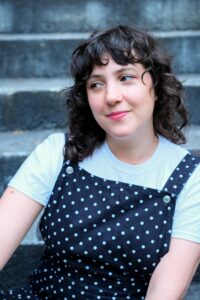A ‘fine calibration of absurdity and reality’
How It Works Out
by Myriam Lacroix
Toronto: Doubleday Canada, 2024
$32.00 / 9780385698405
Reviewed by Jessica Poon
*

For anyone who has ever wondered if they might be happier with their paramour in a parallel universe, for anyone who has ever tired of heterosexuality or New York as literary default, or for anyone who simply wants to have an obscenely good time, How It Works Out by Myriam Lacroix is a panacea for flaccid prose.
Set in Vancouver, the novel’s structure recalls Anagrams by Lorrie Moore, a marvellous short story collection masquerading as a novel. Both Lacroix and Moore feature two characters in wildly different scenarios in each story that ask the reader what, after all, constitutes canonical reality. Like Anagrams, How It Works Out is wittily engrossing, scoring highly on multiple categories of readability—laugh-out-loud one-liners, no boring parts, a fine calibration of absurdity and reality, and the relief of being in the hands of a writer who earns your interest from the onset. Lacroix’s prose is consistently weird and amusingly precise (sample similes: “warm as hams” and “snowsuit dipped in molasses”).
Against odds I just invented for my own convenience, Lacroix has succeeded in writing a wickedly funny story about babies and parenting. (Babies are boring, unless you really adore human potatoes, or it’s the genius baby in Glyph by Percival Everett. Parents, though, are usually interesting, though sometimes it can be hard to tell if they’re especially subsumed.) The opening line of “The Meaning of Life” has the most stylish double negative I’ve seen in some time: “They’d planned on getting beer from Toby’s, but instead they got a baby, and they were not unhappy about it. Myriam and Alison hadn’t talked about kids yet, but finding one seemed to be a sign that it was time. Besides, being lesbians, this spared them the trouble of adopting or getting one of their friends to have sex with them.”

Vancouver’s Lacroix has a knack for making exposition amusing and concise, and does so throughout—I wouldn’t be surprised if Lacroix is a stand-up comedian moonlighting as a debut author.
Myriam and Alison prove to be devoted parents without becoming diluted and dragged under by parenthood. Their parenting has, if you’ll forgive a hackneyed expression, good vibes. For instance: “They were not going to be the kind of parents who call their baby Mozart or Beyoncé. In fact, they immediately agreed they would never wish any real-world success on Jonah. That was how people ended up with stomach ulcers, or making bad art.” Whether Jonah ever gets any critical vaccinations was not made abundantly clear but I suspected rather not.
To read about an affectionate yet conventionally lackadaisical parenting style—Myriam and Allison still have a robust social life after acquiring Jonah; they still have libidos—was almost a marvel. Most stories with women and babies involve some upper middle-class crisis feigning at blue-collar status about the mythical status of work-life balance and unoriginal observations about sexism; maybe the woman will have stains on her shirt and feel self-conscious around better-dressed, richer mothers or feel guilty she missed a crappy school play—these are, I’m sure, important stories—but they have the dullness of back pain and microwave instruction manuals.
In “Love Bun,” Lacroix writes Myriam in first-person, with a candidness Jonathan Swift would appreciate: “We sampled the children, of course, to make sure we weren’t nurturing rotten apples.” The ridiculing of grandiose baby names in “The Meaning of Life” is enthusiastically adopted here, with offspring bearing burdensome appellations like Kale. This moderately cannibalistic story was written with admirably nonchalant verve; the human flesh-eating is a habit to be surreptitious about, perhaps, but not ashamed.
If I really wanted to, I could make an argument this cannibalism story is really an allegory for abundant joy in others’ bodies—a veritable antidote to rampant body dysphoria and self-loathing. All you have to do is snack on your girlfriend’s finger when no one’s watching. I promise, cannibalism is fun here.
In “The Sequel,” Myriam and Allison are famous-ish for ostensibly being gaily gay and writing a book all about it; now, they have to write a sequel, which necessitates convincing fake happiness for the world to see, or genuine happiness. Like most people famous for being happy and desirable, their happiness is fleeting, nonexistent, or suspect.
“The Sequel” is told in Allison’s first-person voice, which is troubled when she questions the authenticity of authenticity:
I think, wow, what an authentic moment, but then I feel guilty, because what does “authentic’ even mean? Is it just a weird ignorant impulse to exoticize some people’s normal lives? And what does it mean that nothing in my own life ever feels authentic? When did I stop caring about art, real art, like that duck hanging from the ceiling by its neck—something that nobody will ever buy but that the artist did just for the sake of doing it? But then I think, does anyone do art for its own sake? Does even the duck artist hope to become famous, but they just don’t get what sells. Maybe nothing is authentic, not even this moment. I like that idea. It doesn’t seem exploitative, and it sort of takes some pressure off in general.
I was simultaneously delighted and horrified by Kristen Stewart being name-dropped—delighted because anything concerning Kristen Stewart is of interest to me, but horrified because even in fiction, the idea that Kristen Stewart would have her own social media account requires a preposterous level of imagination. But then I remember one of fiction’s unspoken tenets is wish fulfillment. And I’m sure there are many people who wish Kristen Stewart had social media, rather than just appearing, beautifully, on Dylan Meyer’s account from time to time.
It’s possible I’ll never think about tomato salad the same way, after this story. The phrase “embarrassing, open-minded bisexual look that always makes me want to crawl into my own mouth” is currently living rent-free in my head. The macabre gleefulness by the end of “The Sequel” is delightful.
In “Anthropocene,” Myriam is a high-powered CEO who, not unpredictably, loves submissive sex with Allison, far lower down the career rung, as a dom. Though sex intersperses the entire book with the same frequency other authors mention the weather, this story is by far the most explicit. What does it mean to have good sex with a person who is, for all purposes, morally dubious? Does this, by proxy, also make you a bad person? The power imbalance being reversed in the bedroom is an old trope, but not yet tired, and it’s made good use of here.
That this irreverently funny yet utterly sincere book takes place in Vancouver, the city of rain and apparently no fun, is nothing short of a miracle. Lacroix could have easily set her novel in a more recognizably cosmopolitan American city—certainly, that would have been the commercial move to make—but she chose Vancouver and I cannot help but feel that it’s a love letter to Vancouver; in particular, Commercial Drive. Sentence by sentence, Lacroix is helping to keep literature weird, just the way it should be. Weird is good; this book is weird; this book is good.
*

Originally from East Vancouver, Jessica Poon is a writer, former line cook, and pianist of dubious merit who recently returned to BC after completing a MFA in Creative Writing at the University of Guelph. [Editor’s note: Jessica Poon has reviewed books by Taslim Burkowicz, Sam Wiebe, Amy Mattes, Louis Druehl, Sheung-King, Loghan Paylor, Lisa Moore (ed.), Sandra Kelly, Robyn Harding, Ian and Will Ferguson, Christine Lai, Logan Macnair, Jen Sookfong Lee, J.M. Miro (Steven Price), Bri Beaudoin, Tetsuro Shigematsu, Katie Welch, Megan Gail Coles, and Ayesha Chaudhry for BCR]
*
The British Columbia Review
Interim Editors, 2023-25: Trevor Marc Hughes (non-fiction), Brett Josef Grubisic (fiction and poetry)
Publisher: Richard Mackie
Formerly The Ormsby Review, The British Columbia Review is an online book review and journal service for BC writers and readers. The Advisory Board now consists of Jean Barman, Wade Davis, Robin Fisher, Barry Gough, Hugh Johnston, Kathy Mezei, Patricia Roy, Maria Tippett, and Graeme Wynn. Provincial Government Patron (since September 2018): Creative BC. Honorary Patron: Yosef Wosk. Scholarly Patron: SFU Graduate Liberal Studies. The British Columbia Review was founded in 2016 by Richard Mackie and Alan Twigg.
“Only connect.” – E.M. Forster
6 comments on “A ‘fine calibration of absurdity and reality’”